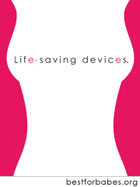 |
| Ameda Ultra |
The ruling, which will affect expenses incurred starting in 2010, will allow mothers to use pretax money from their flexible spending accounts to cover the cost of breast pumps and other supplies. Those without flexible spending accounts may deduct breast-feeding costs if their total unreimbursed medical expenses exceed 7.5 percent of their adjusted gross income and they itemize.
Breast feeding advocates said the new policy would help millions of working mothers continue breast-feeding after returning to the workplace, and improve the health of infants who receive antibodies from the breast milk.
“Now, more women will be able to pass on the health benefits of breast-feeding to their babies, which include protections against asthma and other respiratory illnesses, bacterial and viral infections, and obesity, among other ailments,” said Dr. O. Marion Burton, president of the American Academy of Pediatrics.
 |
| Philips AVENT Isis Duo |
A study by Harvard Medical School last year showed that if 90 percent of mothers followed the standard medical advice of feeding infants only breast milk for their first six months, the United States could save $13 billion a year in health care costs and prevent the premature deaths of 900 infants each year from respiratory illness and other infections.
But as recently as last year, the I.R.S. rebuffed those arguments. The I.R.S. code considers nutrition a necessity rather than a medical condition, and the agency’s analysts said they viewed breast milk as nothing more than a healthy food - meaning that breast pumps, bottles and pads were no more deserving of a tax break than a vegetable steamer.
In a letter reversing that ruling, Douglas H. Shulman, the I.R.S. commissioner, made no mention of the positive health effects of breast milk, but said that pumps and other equipment should be considered a medical expense because “they are for the purpose of affecting a structure or function of the body of the lactating woman.”
 |
| Medela Freestyle |
I.R.S. officials declined to elaborate. But studies show that breast-feeding is also beneficial for the nursing mother, helping her avoid Type 2 diabetes, ovarian cancer, breast cancer and postpartum depression.
Whatever the rationale for the policy change, breast-feeding advocates say it will make it easier for millions of women to heed the prevailing medical advice.
To continue breast-feeding once they return to the workplace, many mothers need to use pumps to extract milk, which can be chilled and fed by bottle to the child later. The pump and the accessories needed to store milk cost about $500 to $1,000 for most mothers over the course of a year, according to the United States Breastfeeding Committee.
A survey by the Centers for Disease Control and Prevention found that about 75 percent of the 4.3 million mothers who gave birth in 2007 started breast-feeding. By the time the baby was 6 months old, the portion dropped to 43 percent, and on the child’s first birthday, to 22 percent.
The I.R.S.’ s initial refusal to classify breast-feeding as a medical expense has frustrated women’s health advocates and pediatricians for years, especially since the federal government offers tax breaks on items like acne cream and denture adhesive. After a news report last fall about the I.R.S. turning down a nursing mother’s effort to use pretax funds for a breast pump, Representative Carolyn Maloney, a New York Democrat, and 55 other members of Congress wrote to Mr. Shulman asking him to revise the policy.
Robin W. Stanton, chairwoman of the United States Breastfeeding Committee, called the announcement a major victory for mothers, infants and America.
“It is critical to our nation’s health that the majority of American women are supported in their decision to breast-feed: the health, psychosocial, economic, and environmental benefits are undeniable,” she said.
February 10, 2011, New York Times
Breast-Feeding Supplies Win Tax Breaks From I.R.S.
By DAVID KOCIENIEWSKI






















I hope some of these nursing accessory how to’s prove to be helpful as you begin breastfeeding your new baby. There are so many new products (some of which truly are unnecessary) on the market today which can very easily confuse new mothers as they try and decide what they will and will not need while nursing. Always ask for help if you are unsure of anything as your baby’s health depends on it. For breastfeeding is a learned function and usually not something we know how to do automatically.
ReplyDelete